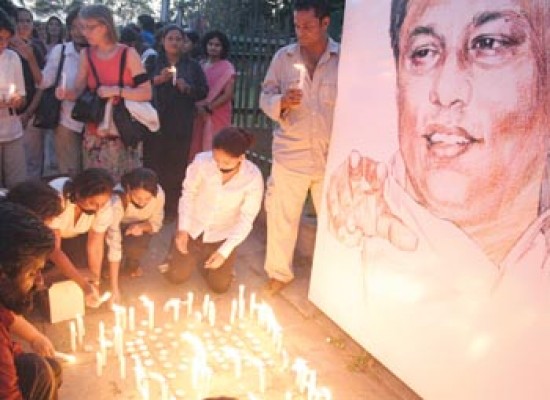Bring back journos in exile and guarantee their safety IFJ urges Sri Lanka
IFJ Urges Attention on Free Speech
As the Universal Periodic Review on Sri Lanka begins at the U.N. Human Rights Council in
Geneva, the International Federation of Journalists (IFJ) and its partners and affiliates in Sri Lanka, urge closer attention to issues of free speech and the right to information, which have been casualties of the quarter century long civil war, and are yet to gain due priority in the post-war environment.
The IFJ and its partners are especially concerned at the reign of impunity which continues to prevail for attacks on journalists and media institutions, and the constant fear that individual media practitioners work under. Even if overt measures of coercion are less conspicuous than during the war years, political and financial power is deployed to silence dissent. Victims of gross human rights violations during the war years are also deprived of a forum through which they can articulate grievances and seek redress.
The IFJ and its associated groups are worried at the failure of Government of Sri Lanka (GoSL) to accept any firm commitments for implementing the recommendations of the Lessons Learned and Reconciliation Commission (LLRC), appointed with a Presidential mandate a year after the end of the war, as part of the national reconciliation process. The LLRC recommendations related to free speech and the right to information, though modest in number, are deeply consequential. Yet the action plan announced in July to give effect to the recommendations of the LLRC does not set down any time-line for the passage of a right to information law and seems to gloss over the need to dispel the climate of impunity for attacks on the media.
Following the resettlement of the last of the internally displaced persons (IDPs) from the Menik Farm camp in the northern province in late September, media persons seeking to travel into the area to report on the quality of life of resettled communities, encountered numerous obstacles from military officials whose presence in the area is reportedly, overwhelming.
The IFJ and its partners observe that the GoSL is in default on three main recommendations of the LLRC: restoration of freedom of movement for media personnel through all parts of the country; the investigation and prosecution of all known cases involving attacks on media practitioners; and the enactment of a right to information law.
In addition, the IFJ and its partners have found that state-controlled media, the Sri Lanka Broadcasting Corporation, the Sri Lanka Rupavahini Corporation, Channel ITN and Lake House publications, have become forums for verbal abuse and vilification of independent journalists and human rights defenders, often with dangerous implications for their physical safety and wellbeing.
Further, news websites hosting content on Sri Lanka have been subject to arbitrary rule changes and frequent obstruction with absolutely no legal or constitutional mandate.
The IFJ and its partners urge the UPR process in Geneva to particularly underline the following steps as urgent priorities for the GoSL to commit itself to:
*Prosecution, on the basis of credible evidence, of all who have been guilty of attacking journalists and news gatherers in the recent past;
• The restoration of independence and accountability of state-owned media, if necessary by initiating the process of conversion to public service media;
• The enactment of a law covering working conditions of all journalists and news-gatherers that provides for fair wages and security of employment, in line with other South Asian countries such as India, Pakistan, Bangladesh and Nepal;
• The enactment of a right to information law; and
• An effort to bring back to Sri Lanka all the journalists in exile, with the assurance that their safety would be guaranteed by the GoSL.
As an immediate priority, the IFJ urges the GoSL to order a halt to the stream of hostile rhetoric over state-owned media channels, which has targeted the nation’s highest judiciary, called forth the possibility of contempt action and created a very real possibility of a collision between the judicial and executive branches.
The IFJ represents more than 600,000 journalists in 131 countries
ENDS

